In the words of SINGHS
by Artika Aurora BakshiThe pen is mightier than the sword! This has been advocated through the years by many. I have always wondered how many of us actually believed in it and how many of us have actually taken that path. Two prominent Sikhs who have lead the way by showing that the pen is indeed mightier than the sword and that freedom of speech should be exercised without any fear of repercussions are KHUSHWANT SINGH and TAVLEEN SINGH.
Both have been prominent in the Indian and International print media for decades and have set a standard so high that very few have been able to reach it.
2012 saw them both release two very unique books. (see below ~ SikhNet editor)
The Free Thinker's Prayer Book- written by India's grand old man. When Khushwant Singh says something or when he writes, we all take notice- we notice it is for sure, whether we agree with it or think of him as someone who has lost his mind.....that is a very personal view and I shall leave it at that.
The introduction takes every individual back to the moment, when we have all questioned the religious and ritualistic dogma that are there in our lives. We have all wondered why???
I am a Sikh by birth and by choice and I too follow all the prescribed rituals! I believe in Universal God and take inspiration from the ten teachers of Sikhism. The lives of our Gurus inspire and guide. In an environment which has no gurudwaras or exposure to Sikhism, it is I, who tell my children, the stories of the Gurus and make them comprehend the verses and hymns in our Granth Sahib.
But there are times when I have questioned the existence of God, the list of prescribed ways to reach him and the very idea of Karma.
In his book, Khushwant Singh raises a question- "if an all-powerful, all-seeing God does exist, why is there injustice and suffering in the world? In our country alone, for every Mother Teresa and Baba Amte, there are thousands who have killed and raped in the names of their gods, as was done during Partition on both sides of the border, in Delhi in 1984 and Gujarat in 2002. Neither the law nor God has made them pay for their crimes."
I too have wondered that if both I and the person who has wronged me are praying devoutly, who will God listen to? My religion does offer me what I seek in terms of support- a crutch sometimes and guidance, and I for one don't believe in conversion to another faith to find solace. You either find it or you don't, as simple as that. But will making me follow the prescribed way, take me to salvation? Here is where, I agree with the author..." ahimsa above all; work as worship; honesty; helping people in need;silent charity and respecting and preserving the natural world- my own religion". Every page as you turn, gently reminds you to cherish life and enjoy every aspect of it.
Every scripture moves and is worthy of admiration.
What Khushwant Singh has done is, put down all these little pearls of wisdom in one little prayer book- a book that inspires and reaches out. Written, so that everyone connects to it, especially the Gen next. It is them we need to reach out to, if we want humanity to prosper. I am not talking about religion, because for me HUMANITY IS MY RELIGION.
A must have book in every house and definitely a pre-requisite for all godmen, preachers and politicians, who have till now been successful in playing with human emotions on the basis of self professed godliness. Thank you Mr. Singh for your little treasure of prayers and precepts.
" life is not always fair. Sometimes the good suffer for their deeds and the wicked prosper. So there is no use telling anyone that there are rewards for the good in life. Goodness of the heart should be a habit, and it's own reward."
What strikes out when you pick up a copy of Tavleen Singh's "Durbar", is the silhouette of Lutyen's Delhi- Rashtrapati Bhawan and South Block, courts that have decided the fate of India and its Indians for more than a century!
The Delhi whose foundations were laid by a group of Sikh Contractors, who Lutyens commissioned to build a capital worthy of an Empire that would stand tall amongst others. The same Delhi, which silently watched as more than 3000 Sikhs were massacared in the reigm of the most democratic party India has seen. A pogram which is still a wound that is far from healed, because justice has been knowingly delayed or should I assume denied.
The book starts with a very powerful note from the author, a typical firebrand trademark of Singh.
Throughout the book, you get to read little personal accounts seeped in what is a typical Delhi Society nuances. The parties, the politics and the big hearted punjabi way of life!
Singh started her career in the same year that I was born. The red tapism that existed that time can still be found in our country, where babus rule and paper pushing still is a common practice. It's the connections and pulls that work.
Coming back to the book, every page as you turn tells you a story that is so captivating that you cannot put it down. Facts can be cross checked. Covered in this book are the events that have shaped the India we see today. Named openly in the book are all the game players. Singh's account is a bit biased, but then we all take that from a memoir. Given the position she was in and still is in, it is a good history lesson for the younger generation. Timing is apt too with the elections coming up soon. Whichever party has led India since Independence, the state and condition has remained unchanged. From the power brokers at the centre to the regional parties, everyone has milked India and the citizens for personal gains. Religion, caste and ethnicity has been used by our so called leaders to keep the KURSI ( chair).
Reference to this book has come up again in today's scenario. On 30th April, 2013, one of the main instigators of the 1984 pogrom, Sajjan Kumar was acquitted by the Delhi High Court in one of the three registered cases. Durbar openly spoke about 1984- the reasons why it escalated and the inability or the unwillingness of the Congress to do anything to stop the carnage.
Coming back to the book, it may be biased and a bit exaggerated, but it is a real eye-opener. From the Congress to the Janata Government to the NDA and UPA, who do we as Indians turn to, if all they care about it is one upmanship and hidden personal agendas.
![]()
Khushwant Singh's Freethinker's Prayer Book: A Review by Rakhshanda Jalil | Hindustani Awaaz
Wednesday, January 16, 2013: I must begin this review with a confession: I am an unabashed admirer of Khushwant Singh. I have known him for years and enjoyed many a delightful evening in his cozy flat listening to his yarns and talking about his three great passions: people, poetry and politics. Ensconced in his favourite armchair, his feet atop a cane stool, a fire blazing in the hearth, surrounded by piles of new books gifted to him in equal numbers by aspiring and established authors, he is witty, curious, engaging; in fact, a very far cry from the 'dirty old man' of popular imagination. Till his health permitted, he would permit two or three or four (never too many to make a crowd) of his friends and admirers to drop in (always after taking a prior appointment) at a scheduled time (starting from 7.00 pm sharp and ending on the dot of 7.45 as he sits down for his dinner at precisely 8.00 pm). Recent years have seen him retreating from public life and meeting fewer and fewer people; though, as the number of his books continues to grow at a steady pace and his columns continue to appear, the 'Sardar in the Bulb'(immortalised by the cartoonist Mario Miranda) continues to light up the life of countless Indians with his deep insight into human nature.
After several best-selling books in a career spanning six decades, comes his newest offering: The Freethinker's Prayer Book and Some Words to Live By (Aleph, 2012). Only someone who does not believe in God yet recites the Gayatri Mantra without fail when he gets up before dawn every day, who proclaims to be an agnostic yet knows large chunks of the Bible and the Holy Quran by heart, who has consistently tossed his hat at the windmills of the gods yet evidently draws his strength and inspiration from some hidden source somewhere could have written such a book. The words of Mother Teresa, Gandhi, Kabir, Marcus Aurelius, St Thomas Aquinas, Lalan fakir, Shah Abdul Latif and many more merge seamlessly and effortlessly. Prayers and snippets by poets, philosophers and prophets ranging from William Blake to Maulana Rumi to Lao Tsu, passages from religious texts as diverse as the Vedas, Upanishads, Avesta, Granth Sahib, as well as verses from Tagore, Ghalib and Keats make this an eclectic and individualistic culling from a man who has sipped long and deep at the fount of learning. Yet, in a manner typical of Khushwant, he remains characteristically irreverent:
'Once you have decided not to bow to any gods, and if you have a good bullshit detector, it is possible to separate the sublime from the ridiculous and derive inspiration from the words of prophets and poets, gurus and rogues, grave men and clowns. There is a lot to be learned from both the sacred and the profane. I have done that nearly all my life and put down in my notebooks hundreds of lines from different sources that appealed to me... I offer them to you as life codes from an ancient and unrepentant agnostic. Read them with an open mind and an open heart.'
Justifying this wide-ranging selection, Khushwant concludes thus:
'Since I am not obliged to hold any scripture as sacrosanct, I think I have been able to cull the valuable and memorable from each holy book, ignoring a lot that is of indifferent literary quality, illogical or contrary to a humane and liberal world view.'
At 97, Khushwant has been saying that it is time for him to hang up his boots and go. But those of us who have grown up on a steady diet of Khushwant Singh's writings - be they in the form of columns, editorials, translations, book reviews, books of fiction and non-fiction - can only wish him long life and good health, and say: 'Allah kare zor-e-qalam aur ziyada...'
(Rakhshanda Jalil is a Delhi-based writer and columnist.)
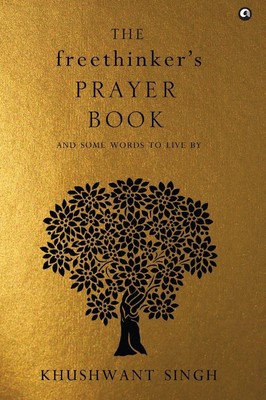 |
Specifications of the book (Hardcover): The Freethinker's Prayer Book And Some Words To Live By Contributors Author : Khushwant Singh Book Details Publisher : Aleph Book Company Publication Year : 2012 ISBN : 13 9788192328041 ISBN : 10 819232804X Language : English Binding : Hardcover Number of Pages : 208 Pages |
|
About the Author |
|
In the Introduction to the book: • Introduction • By the time this book is published, I will be ninety-seven. I am a very old man. And there is one eternal truth I can tell you right away: Old age is not pleasant; it buggers up your life. I am not yet senile, but my memory, of which I was very proud, is failing. Though I can still read, my hands shake so much that it is difficult to write anything legible. I have been spared the indignity of shitting in bed pans and having nurses wipe my bottom, but I often need assistance to get to the toilet. I am on more pills than I can count. In short, my body is giving up. It is time to say alvida and depart. I am reminded of these lines by John Keats: Now more than ever seems it rich to die, In the Mahabharata it is written,‘Man grows old, but not desire.’That great showoff, Oscar Wilde, said it more dramatically:‘The tragedy of old age is not that one is old, but that one is young.’ They are both right. This is another reason why advanced age is a nuisance. The heart desires all the things you did in your youth, but time slowly robs you of the means to get them. But I should not complain. I have lived a reasonably contented life, and it will be easy to go. Sometimes, however, I wish I knew where to. I am not a man of faith. Since I do not believe in paradise or the possibility of rebirth, I have no idea where I will be after I die. It is like staring into an endless dark void. Paul Valery put it very well: ‘Death speaks to us in a very deep voice but has nothing to say.’ For many years I dreaded death. To cure myself of the phobia, I would go to the cremation ground at Delhi’s Nigambodh Ghat and watch corpses burn to ashes and bone. It was cathartic. It cleansed me of petty vanities and anxieties and I returned home at peace with myself. But it did not help me overcome my fear. Now, I am no longer afraid of dying — in fact, the end will be welcome, as long as it is swift and painless. I have made my peace with the great void. But I still don’t know where I will be after I breathe my last. People who have religion seem to derive comfort from the belief that they will meet their Maker after they die, or that they will be reborn in some form. The more self-righteous among them are convinced that they will ascend straight to heaven. As an agnostic, I have no such comfort. So be it. I have no regrets. Rejecting the idea of God and giving up on the basics of religion was not easy. It required searching within myself and questioning beliefs on which I had been nurtured. And once I had done it, how would I fill the vacuum? How could one explain the universe, life on earth and the laws of nature? Reason and logic helped me demolish much that I had been brought up on, but they did not give me all the answers I was looking for. So began the quest for a personal religion. Iqbal echoed my sentiments: Dhoondta phirta hoon main, ai Iqbal, apney aap ko (Wandering through life, O Iqbal, in search of Self |
==================================
Five reasons why Tavleen Singh’s Durbar is my favourite book this season
A Book Review
Source
Book Revew by G Pramod Kumar
For those who grew up in the seventies and the eighties, political gossip of the old world in India is still so delectable. Those pre-neoliberal, pre-satellite TV politicians had an intrigue and star-quality that any amount of trivia on them made us crave for more.
In fact, those years were not just about India, but also about the ruling elite in Pakistan, Bangladesh, Sri Lanka and Nepal. All of them had a similar allure that was appealing to us. Journalists who purveyed this trivia were so hallowed because they seemed to enjoy exclusive proximity to the elite; and, more importantly, they didn’t come in hundreds, shouting from cluttered TV screens as it happens today, but in ones and twos.
In fact, there were only a handful of them who were capable of regaling us with palace gossip. So when Tavleen Singh, an old timer, decided to reload it for us in her new book Durbar, it promised to be compelling vintage. It’s an easy read and one can finish it at one go, as easy as reading a longish magazine article.
I have at least five reasons why Durbar has become my favourite this season. They are not in any particular order, but they go from the big to the small.
One: What I loved the most in Durbar is Tavleen Singh’s omnipresence. She appears to be like Spiderman, who is present wherever there is action — whether it’s Turkman Gate, 1984 riots, troubles in Kashmir, Operation Blue Star and Black Thunder, the IPKF interventions in Sri Lanka, innumerable political meetings and elections, and even critical developments in Pakistan — all this and more while zipping from one drinks-and-dinner party to another, with Naveen Patnaik in tow.
I am sure it would have made incredible sense to a penny-pinching boss to have one person do so much, that too when journalism didn’t pay well. I assume that she was a veritable one-person bureau. Such a pity that her editor at The Telegraph and Sunday, MJ Akbar, tried to sideline her.
I have also learned from Durbar the importance of Tavleen Singh in shaping the career of MJ Akbar. Without that first ever interview with Rajiv Gandhi and a subsequent private lunch with him and Sonia, that Tavleen arranged for MJ Akbar, perhaps he couldn’t have fast-tracked his career. But in the end, he clips her wings. So petty!
The name Tavleen is also an inspiring trailblazer. Nobody before her had such a name (it was her father’s invention), but hundreds born after her assume her name. The name even inspires Salman Rushdie to create a character in Satanic Verses. Wow!
Two: While being everywhere, she just refuses to be a petty reporter. Instead, she doubles as an interlocutor, political counsel, messenger, diplomat and even an adventurous good samaritan. She advises political leaders such as Rajiv Gandhi, does a bit of PR/image consultancy, passes on messages, warns rulers about socio-economic and religious trends, saves people who are in life-threatening situations and even dabbles in a bit of diplomacy, particularly after an all-expenses-paid trip to somewhere in Morocco.
I really love the idea of the centrality of a journalist to everything around us. We have seen this only in films, and heard it only in Radia tapes.
Three: It is really enlightening to know how important dinner and drinks parties had been in running the country. They sound thrilling when wine and scotch whisky had to be bootlegged. Her descriptions are immensely revealing to those who couldn’t even reach the outer perimeters of the Mapus and princes of India that she partied with.
Aha, what a wonderful world with all those imported perfumes, chiffons; silver furniture, princes, maharajas, maharanis and the regalia; and the “servants” and maids in a rotten country of ugly people. For once, I pictured in mind retrofitted editions of Hello and People magazines. The best of all the party scenes is the one in which Tavleen sits next to Rajiv Gandhi and asks him about emergency immediately after Indira Gandhi lost the elections and he says how relieved he was that somebody has asked the question.
Four: In Durbar, everything happens in Delhi and the protagonists are the Gandhi family and the khadi-kurtawallas of the north Indian states. I was very happy to note that the likes of Devaraj Urs, Gundu Rao, K Karunakaran, Kamaraj, Moopanar and Brahmananda Reddy, who we thought were among the movers and shakers in Delhi, do not even figure once in Tavleen’s detailed accounts.
I am now sure that they were not even the outliers, in the scheme of things in Indian politics. I guess the only mention in Durbar about south Indian politicians is when Tavleen describes her meeting with the LTTE leader Prabhakaran, who was “fawned over by south Indian politicians”.
This is such a gem — the old world of Madrasis is back, where everybody from South India is the same, whether they are from Tamil Nadu, Kerala, Andhra Pradesh or Tamil Nadu. But I am still wondering if those who fawned over Prabhakaran were from Andhra Pradesh or Kerala.
Five: This is something to do with my own skill-building in writing. Why keep notes and annoy readers with footnotes and annotations? Durbar is a great exercise of non-specificity, which still has detailed accounts — all easily reconstructed from memory.
Does it matter if some event happened in “either 1986 or early 1987” or what she rattles off her mind is the exact conversation that happened 20 or 30 years back? Not really.
What matters is the story. More than half the characters in the story are dead and the other half, including Sonia Gandhi, have no time to even refute disastrous allegations against her family.
So, let’s just write — this is a skill I have learned from Durbar.
I can proudly note that I hadn’t kept a single note from Durbar while writing this.
|
About the Author
She completed her education in India and started her career with a reporting job at the Evening Mail, Slough (England), where she worked and trained for two and a half years under the Westminster Press/Thompson training scheme. Singh returned to India in 1974 to work with The Statesman as a reporter. She joined The Telegraph as a Special Correspondent in 1982. In 1985 and also in 1987 she became the South Asia correspondent of the Sunday Times, London. Subsequently she became a freelancer and started writing for India Today and The Indian Express. In 1990 she began her stint with television by heading Plus Channel's Delhi bureau. Singh presented two video magazines called People Plus and Business Plus. She has done Ek Din Ek Jeevan, a Hindi weekly programme for STAR Plus. Currently, she is with The Indian Express, for which she writes a weekly column, on Sundays Tavleen has a son with late Pakistani politician Salman Taseer. Talveen Singh is a noted political columnist and television personality. As a correspondent she has covered political events in the subcontinent and troubled states like Punjab and Jammu and Kashmir for various newspapers and magazines including the Telegraph, Sunday, India Today and the Sunday Times, London. She is a recipient of the Sanskriti award for journalism in 1985 and the Chameli Devi award for best journalist in 1987. |
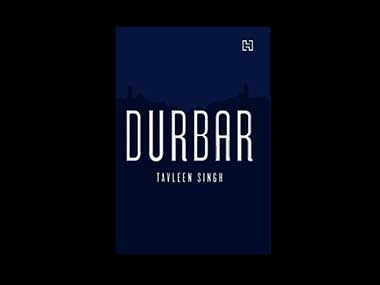 Book Details Title: Durbar Publisher: Hachette India Author: Tavleen Singh Edition: Hardcover Language: English ISBN: 9350094444 EAN: 9789350094440 No. of Pages: 324 Deliverable Countries: This product ships to India, Sri Lanka. |
|
About the Book : A revealing account of our political past that holds crucial lessons for today’s India. In the summer of 1975 Tavleen Singh, not yet twenty-five, started working as a junior reporter in the Statesman in New Delhi. Within five weeks, Prime Minister Indira Gandhi declared the Emergency, suspending fundamental rights and imposing press censorship, and soon reckless policies said to be authored by the prime minister’s younger son were unleashed on India’s citizens. As the country suffered under the iron fist of an elected icon and her chosen heir, Tavleen observed that a small, influential section of Delhi’s society – people she knew well – remained strangely unaffected by the perilous state of the nation. Before long, members of this circle were entrenched in key positions in the Indian government......more |
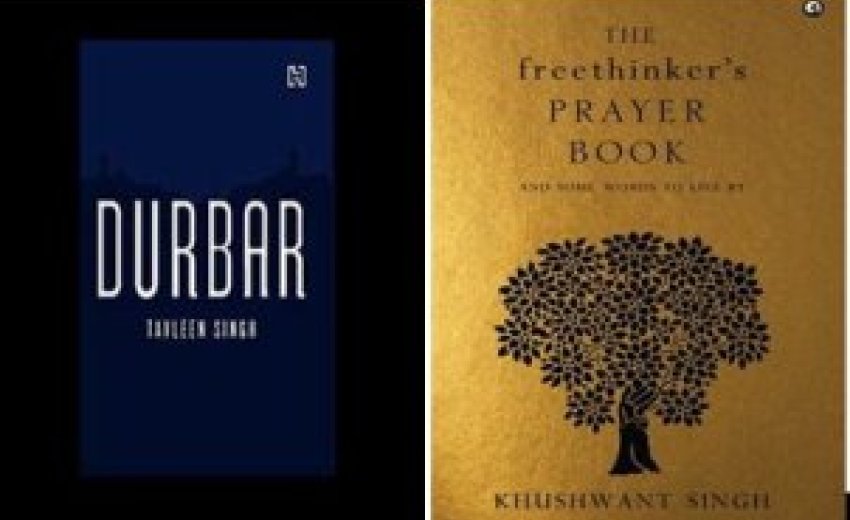
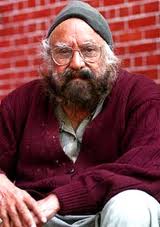 Born in Punjabs Hadali village (now in Pakistan) in 1915 Khushwant Singh has acquired an iconic stature: he is, arguably, Indias best-known and most widely read author, columnist and journalist. He was founder- editor of Yojana, and editor of The Illustrated Weekly of India, National Herald and the Hindustan Times. His first book, The Mark of Vishnu and Other Stories, was published in 1950, and he has published several acclaimed and best- selling books of fiction and non-fiction in the six decades since. The best known among these are the novels Train to Pakistan, I Shall Not Hear the Nightingale and Delhi; his autobiography, Truth, Love and a Little Malice; and the two-volume A History of the Sikhs. He has also translated the work of major Urdu and Punjabi poets, novelists and short-story writers. Khushwant Singh was member of the Rajya Sabha from 1980 to 1986. He was awarded the Padma Bhushan in 1974; he returned the award in 1984 to protest the siege of the Golden Temple by the Indian army. In 2007, he was awarded Indias second highest civilian honour, the Padma Vibhushan........
Born in Punjabs Hadali village (now in Pakistan) in 1915 Khushwant Singh has acquired an iconic stature: he is, arguably, Indias best-known and most widely read author, columnist and journalist. He was founder- editor of Yojana, and editor of The Illustrated Weekly of India, National Herald and the Hindustan Times. His first book, The Mark of Vishnu and Other Stories, was published in 1950, and he has published several acclaimed and best- selling books of fiction and non-fiction in the six decades since. The best known among these are the novels Train to Pakistan, I Shall Not Hear the Nightingale and Delhi; his autobiography, Truth, Love and a Little Malice; and the two-volume A History of the Sikhs. He has also translated the work of major Urdu and Punjabi poets, novelists and short-story writers. Khushwant Singh was member of the Rajya Sabha from 1980 to 1986. He was awarded the Padma Bhushan in 1974; he returned the award in 1984 to protest the siege of the Golden Temple by the Indian army. In 2007, he was awarded Indias second highest civilian honour, the Padma Vibhushan........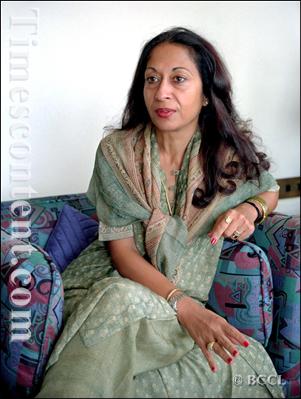 Singh was born in Mussoorie in 1950 and studied at the Welham Girls School. She did a short-term Journalism course from the New Delhi Polytechnic in 1969.
Singh was born in Mussoorie in 1950 and studied at the Welham Girls School. She did a short-term Journalism course from the New Delhi Polytechnic in 1969.